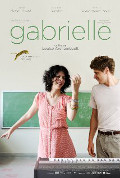
Directed by
Louise Archambault
102 minutes
Rated M
Reviewed by
Chris Thompson

Gabrielle
Synopsis: Gabrielle (Gabrielle Marion-Rivard) is a young woman affected by Williams’ syndrome, a genetic condition that is characterized by medical problems, developmental delays, and learning disabilities. These occur side by side with striking verbal abilities, highly social personalities and an affinity for music. Thus Gabrielle has an infectious joie de vivre and exceptional musical talent. She met her beloved Martin (Alexandre Landry) at the leisure centre where they are both members of the choir but because they are “different”, their nearest and dearest will not allow them to love each other as they wish to. As the group prepares for an important musical festival, Gabrielle does all she can to demonstrate her independence but she will need all her determination to outface prejudice and her own limitations if she is to continue her relationship with Martin.
Much of the action of this sweet film is set in the rehearsal room of Gabrielle’s local recreation centre where the members of Les Muses de Montreal, a real-life mixed-ability choir are preparing for their participation in an upcoming music festival. One of the songs they rehearse speaks about the desire of a pop star to be seen not as special, but as just an ordinary guy. In many ways, it represents the central idea of the film. Gabrielle, a member of this ‘special needs’ group wants more than anything to be ordinary. She lives in assisted accommodation with several other choir members. She has a menial job collecting and shredding recycled paper in an office. But she wants to live an independent life. She wants a baby and she wants to act upon her love for fellow choir member, Martin. It’s here that the film tackles the difficult issues of how the realisation of these desires is hampered, partly by her disability and partly by the attitudes of others, in particular Martin’s over-protective mother who visibly bristles at the idea of her son and this girl having a sexual relationship.
This is a familiar story that, in many ways, travels a familiar landscape towards an inevitable triumph of the spirit. What elevates this film though are the captivating performances of Marion-Rivard, who has Williams syndrome, and Landry, a theatre actor who does not. They are innocent, hopeful and vulnerable in their authentic and touching portrayals of two young people who have found each other and are now trying to find a place where they can be together. The supporting cast; a mix of actors and actual choir members, provides a backdrop of family, friends and carers whose own struggles with personal conflicts and differing opinions about what is appropriate for Gabrielle and Martin ensures that the course of this true love does not run smooth. The most emotionally engaging moments, however, are often due to the choices Archambault makes with her use of the camera to draw us in to hidden, tactile moments; an unseen gesture, a facial reaction, the touch of fingers to hair or skin brushing against skin. These lovely private, erotic textures are heightened by the several occasions of close, intimate contact where the sound drops out altogether, almost as if the story is holding its breath for what will happen next.
For anyone who has worked in the area of performance and disability there are many genuine and resonant touchstones in Gabrielle that remind us of the power of song and artistic expression to free the spirit and unify a group who might otherwise find themselves on the outer. As choirmaster Remi (played by Vincent-Guillaume Otis) says at one point, ‘Sing the pain away’.
The screenplay by Archambault in consultation with Valerie Beaugrand-Champagne cleverly shifts between the almost documentary-style glimpses into the lives of this group and the workings of the choir and the charming and romantic narrative that, despite a somewhat convenient and conventional ending and the rather strange lyrics of the final song, leaves us feeling good about life and hopeful for our two young lovers.

Want more about this film?


Want something different?




